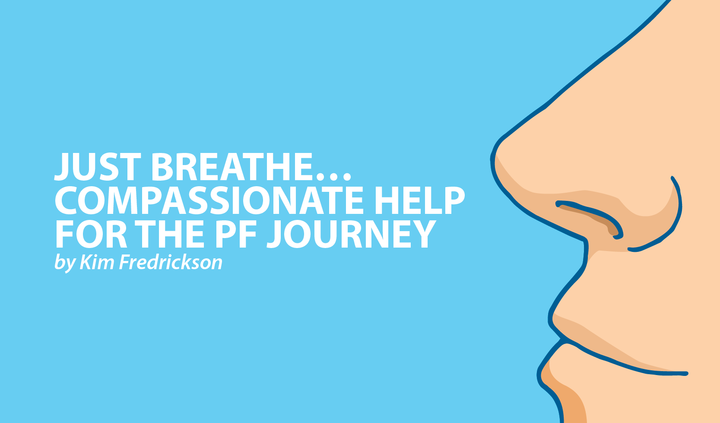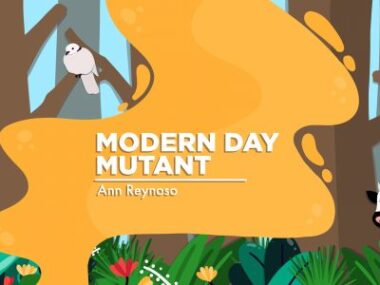Grief Can Be a Friend on this PF Journey
Written by |

Last week I shared how important it is to make friends with your emotions, especially as a pulmonary fibrosis patient.
I’ve been wading through a boatload of very difficult emotions since being diagnosed with pulmonary fibrosis two and a half years ago. As a marriage and family therapist and pulmonary fibrosis patient, I have worked hard to stay in tune with my feelings, and have found that grief has become a friend as I negotiate these tough times.
Grief is the answer to processing loss, pain and disappointment
You may be afraid of these intense feelings and can’t believe they are good. I know. But they are. Grief is a cyclical process, and a new wave happens every time my health changes and I face reality and my new normal. It’s really important to find healthy ways to process these emotions so they don’t take us down.
When grief is unprocessed it can lead to depression, bitterness, feeling stuck, and a whole lot of other difficult things. Life is full of wonder and joy … and also loss, especially when you are a pulmonary fibrosis patient.
I recently had an experience where I let myself experience my grief in the moment
It was very helpful to me, so I wanted to share this experience with you. I was at a workshop about a year ago led by a good friend. It was my first time seeing my colleagues and former counseling students at Western Seminary,Sacramento while using supplemental oxygen. I prepared myself to show up in this new way, and for the most part was OK with it.
But I wasn’t prepared for what happened next …
As my friend Ken went up to speak, I had a tidal wave of grief hit me. Here’s the back story: I love public speaking and conveying much-needed information in practical and helpful ways. Over the past 30 years I led many workshops about parenting, relationships, and developing a compassionate relationship with yourself.
When I saw Ken go up to the podium, it hit me that I wouldn’t be able to do this anymore because of my progressive lung disease and being on supplemental oxygen.
I immediately became teary and thought, “I need to cry right now”
I excused myself and went to the restroom with my iPad in hand. I cried solidly for about 10 minutes, and then I started to type what I was thinking and feeling. Here’s some of what I wrote:
“It’s so hard to be here. He’s doing what I love doing … what I used to do. It is so hard. All the counselors here are preparing for their clients, building their practice. I’m closing mine down.
“I love seeing everyone … I want to see if I can stay at this workshop.
“Let me use this for good. I want to do public speaking as long as I can. Not only do I believe in the message I have to share, I also enjoy the process of teaching it.”
I asked myself a couple of important questions:
“How do I get up to speak without crying, being overwhelmed with grief?”
- I’ll practice, and share a little of the reality I’m going through.
- I’ll do videos.
- I’ll do shorter talks and sit down when I speak.
- I’ll do Skype and FaceTime talks.
- I’ll start a blog and communicate that way.
“Why go to all this effort?”
- I’ve been given something to share that is valuable.
- This is clearly really important to me, and I need to pay attention to myself.
- I’ll do public speaking as long as I’m able.
“What do I want to communicate?”
- That self-compassion is essential. Why?
- The relationship you have with yourself affects everything (health, relationships, parenting, marriage, work, spiritual life, and emotional health).
***
It sure helped me pay attention to my grief and take the time to cry, get some space to myself, and process both my thoughts and feelings. I hope this helps give you a snapshot of how allowing yourself to grieve, while being supportive of yourself in the process, helps us work through the enormously difficult tough times we are going through.
Being diagnosed with this awful disease brings up so many overwhelming emotions
Figuring out how to release these emotions in ways that don’t hurt you or someone else is critical and brings much needed relief. Please know that a diagnosis of pulmonary fibrosis includes repeated moments of grief. It doesn’t happen one time. I grieve every day as I’m reminded of how my life has changed, and all the moments I will miss. I will continue to have many more. As I allow myself to express my grief while being supportive of myself, I notice it is not building up inside of me, for which I am grateful.
Since attending that workshop, I’ve been fortunate to be able to do many live videos on Facebook, including one on the Pulmonary Fibrosis News’ Facebook page two weeks ago about how to be a good friend to yourself while living with PF. It’s such a blessing to still be able to teach and interact with others from the comfort of my home!
Next time I’ll cover more specifics on the grief process and offer some resources.
Questions to ponder …
- What is your response to the idea that grief can be a friend?
- What stood out for you in this post?
- When has allowing grief helped you move forward?
- What are some simple ways you allow yourself to grieve?
Comments, please!
I’d love you to share any comments, questions, or additional helpful ideas below that you’d like to share with our PF community.
Note: Pulmonary Fibrosis News is strictly a news and information website about the disease. It does not provide medical advice, diagnosis, or treatment. This content is not intended to be a substitute for professional medical advice, diagnosis, or treatment. Always seek the advice of your physician or other qualified health provider with any questions you may have regarding a medical condition. Never disregard professional medical advice or delay in seeking it because of something you have read on this website. The opinions expressed in this column are not those of Pulmonary Fibrosis News, or its parent company, Bionews Services, and are intended to spark discussion about issues pertaining to pulmonary fibrosis.
Save








Robert Lang
Thank you for reminding me that it is ok to grieve.
I was diagnosed with IPF about two and one half years ago and am now constantly on oxygen. At night I have to use the Trilogy machine to force me to breath. Last year I celebrated 50 years of active pulpit ministry ( I recently celebrated 75th birthday). Up to the diagnosis I was still fairly active. Now I am unable to speak more just a few words before losing my breath even on 5 liters of oxygen. Many questions and much frustration have become constant.
Thank you for Kim’s article.